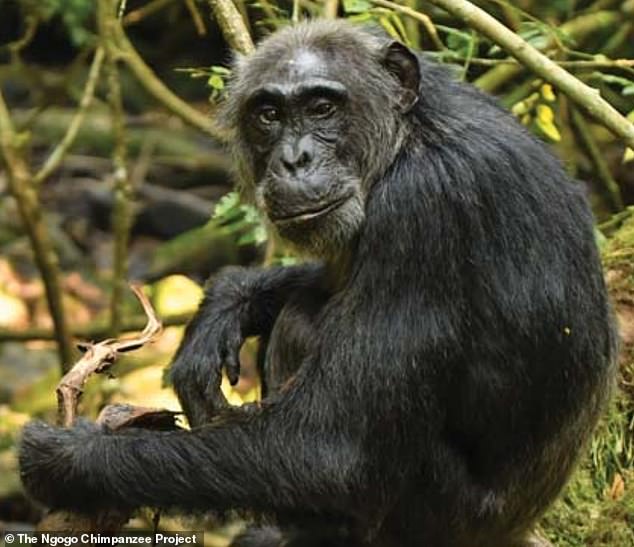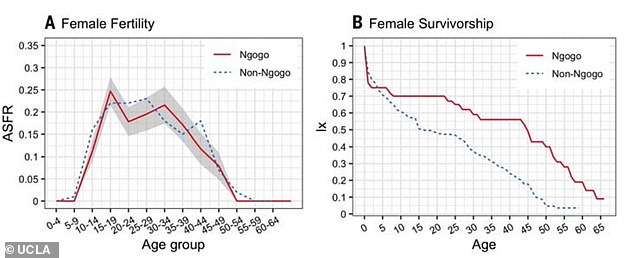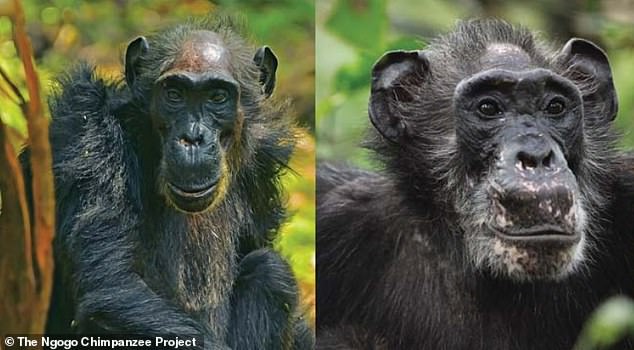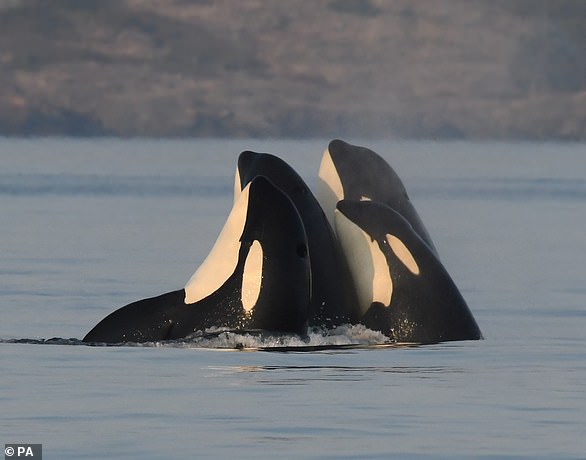Chimpanzees go through the menopause just like humans, study finds – and it suggests we’re more similar to great apes than first thought
>
It has been found that chimpanzees go through menopause in the same way as humans and a handful of other species.
It was thought that besides us, only a few species of whales live so many years of their lives after losing their ability to reproduce.
However, a new study has discovered signs of menopause in a group of wild female chimpanzees in Uganda.
This suggests that we may be more similar to great apes than initially thought, and could provide clues about how this rare trait evolved in humans.
Scientists have struggled to explain why this happens because the evolutionary benefits are vague.

Discovery: A new study finds that chimpanzees are among a small group of species that go through menopause in the same way that humans do.
“In societies around the world, women beyond their childbearing years play important roles, both economically and as wise advisors and caregivers,” said lead author Brian Wood, an associate professor of anthropology at UCF.
“How this life history evolved in humans is a fascinating but challenging mystery.”
Most mammals remain fertile until they die, and humans and several species of toothed whales have been the only outliers discovered up to this point.
Women usually go through menopause between the ages of 45 and 55.
The ovaries stop producing as much estrogen and no longer release an egg every month, which means the woman is unable to get pregnant naturally.
In the new study, the researchers calculated a measure called post-reproductive representation (PrR), which is the average proportion of adult life spent in a post-reproductive state.
Most mammals, including other chimpanzee groups, have a PR ratio close to zero.

Researchers have discovered signs of menopause in a group of female chimpanzees in Uganda

What the scientists found: Urine samples taken from 66 females of different ages and reproductive status also showed that this period of menopause is characterized by changes in hormones such as gonadals, estrogens and progestins.
However, the Ngugo chimpanzee community in Kibale National Park in western Uganda has been found to have a PR of 0.2 – meaning the average female lives 20 per cent of her adult life in a post-reproductive state.
Urine samples taken from 66 females aged between 14 and 67 years also showed that this period of menopause is characterized by changes in hormones such as gonads, estrogens and progestins.
The data showed that Njojo females, like humans, went through menopause from about the age of 50.
“This study is the result of an extraordinary effort,” said co-author Jacob Negri.
“Only because our team has spent decades monitoring these chimpanzees can we be confident that some females live long after they stop reproducing.
“We also spent thousands of hours in the forest collecting urine samples from these chimpanzees to study the hormonal signals of menopause.”
However, unlike humans, chimpanzees were not involved in helping raise their “grandchildren,” which is inconsistent with the “grandmother hypothesis.”
This theory was first proposed in the 1950s and suggests that menopause may have evolved Because grandmothers play an important role in helping to care for their children.
It suggests that females in their post-reproductive years may be able to pass on more of their genes by helping to raise their children’s birth rates or by directly caring for their grandchildren, thus increasing the odds that the grandchildren will survive.
“The (study) results show that under certain environmental conditions, menopause and post-fertile survival can emerge within a social system that is very different from our own and does not include ancestral support,” Wood said.
Chimpanzees have very different living arrangements than humans.
Older females generally do not live near their daughters or provide care for their grandchildren, which means that the grandmother hypothesis would not explain why they live long beyond their reproductive years.
Fertility in chimpanzees has been found to decline after the age of 30, while no births have been observed after the age of 50 for two decades.
One explanation for the lack of menopause in other groups of chimpanzees may be due to the negative impact humans have had, the researchers say.
“Chimpanzees are extremely vulnerable to death from diseases that originate in humans and to which they have insufficient natural immunity,” said co-author Kevin Langergraber, of Arizona State University.
“Chimpanzee researchers, including us at Ngogo, have learned over the years how devastating disease outbreaks can be to chimpanzee populations, and how to reduce their chances of occurring.”
What they’re basically saying is that this chimpanzee population has a lower risk of dying at an early age than other wild populations, which means it’s easier to notice that females have gone through menopause because more of them live longer.
The new study was published in the journal Sciences.
(Tags for translation) dailymail

